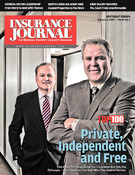Insufficient Warning
“I think all three agencies have been irresponsible in not accurately warning citizens.”
—Stephen Smith, executive director for the Southern Alliance for Clean Energy, criticizing federal, state and Tennessee Valley Authority officials for their handling of safety concerns after coal fly ash broke out of a retention pond at a coal plant in Harriman and blanketed a nearby neighborhood.
Greenbrier Crossroads
“The Greenbrier is at a crossroads. The market for luxury hospitality services is shrinking rapidly in this economy.”
—CSX Chief Executive Michael Ward blaming the struggling economy for the losses of his firm’s Greenbrier resort in West Virginia. CSX has hired an investment baker to explore options for the high-end property.
Luring Business
“We have seen higher submissions and higher win rates.”
—Mike Foley, chief executive of Zurich North America Commercial, maintaining that Zurich’s strong financial position is helping it lure business away from competitors. He declined to name rivals losing business.
Wrong Route
“We are disappointed the FTC chose this route, despite the industry’s good faith efforts to work cooperatively to find a sensible, secure, and cost effective alternative to provide the data the FTC says it needs to conduct its study. The use of a ‘compulsory process’ does not allay our serious concerns about the handling and protection of massive amounts of consumer data.”
—David Snyder, American Insurance Association vice president, commenting on the Federal Trade Commission’s decision to study credit-based insurance scores and homeowners insurance.
Madoff Effect
“The litigious environment that prevails means that it’s inevitable that financial institutions who invested clients’ assets in Madoff’s funds will face actions from disgruntled clients seeking to recover lost monies.”
—Paul Towler, of Lloyd’s broker Jardine Lloyd Thompson Limited, on the effect of Bernard Madoff’s Ponzi scheme.
Longer Hard Market
“In previous hard markets, price increases attracted new capital investment to the market, and the increase in insurance supply led to short hard market cycles. In the current economic environment, where credit markets are essentially frozen, capital to create new insurance and reinsurance capacity may be in short supply. With capital scarce, the coming hard market could be longer in duration than those of the past several decades.”
—David K. Bradford, executive vice president, Advisen.
Topics Market
Was this article valuable?
Here are more articles you may enjoy.


 Chubb Posts Record Q4 and Full Year P/C Underwriting Income, Combined Ratio
Chubb Posts Record Q4 and Full Year P/C Underwriting Income, Combined Ratio  Florida Senate President Says No Major Insurance Changes This Year
Florida Senate President Says No Major Insurance Changes This Year  Lawyer for Prominent Texas Law Firm Among Victims ID’d in Maine Plane Crash
Lawyer for Prominent Texas Law Firm Among Victims ID’d in Maine Plane Crash  After Falling 6% in 2025, Average Auto Insurance Cost Will Stabilize in 2026, Says Insurify
After Falling 6% in 2025, Average Auto Insurance Cost Will Stabilize in 2026, Says Insurify 


